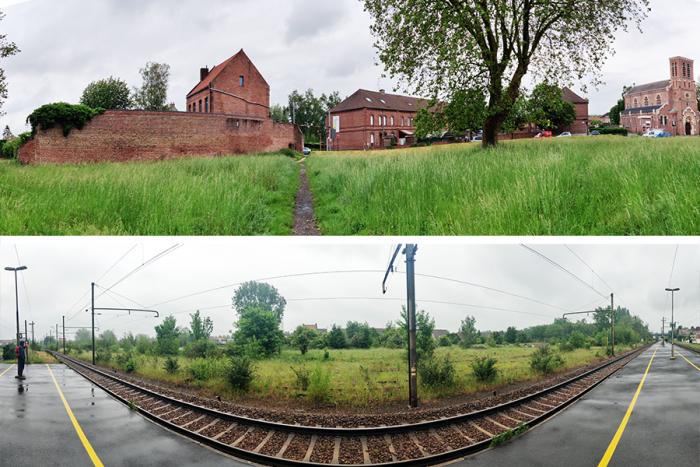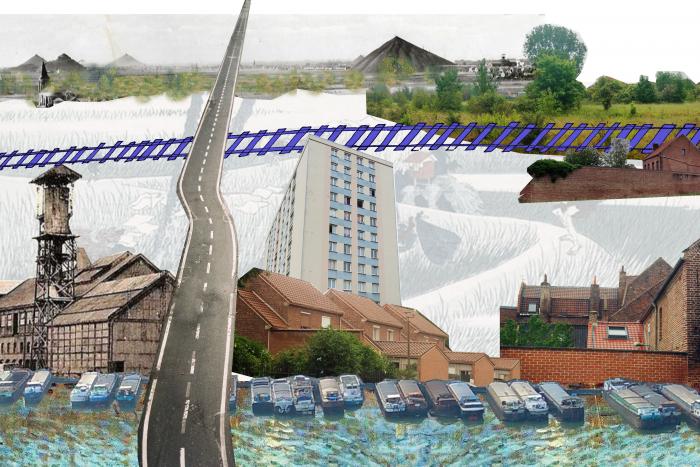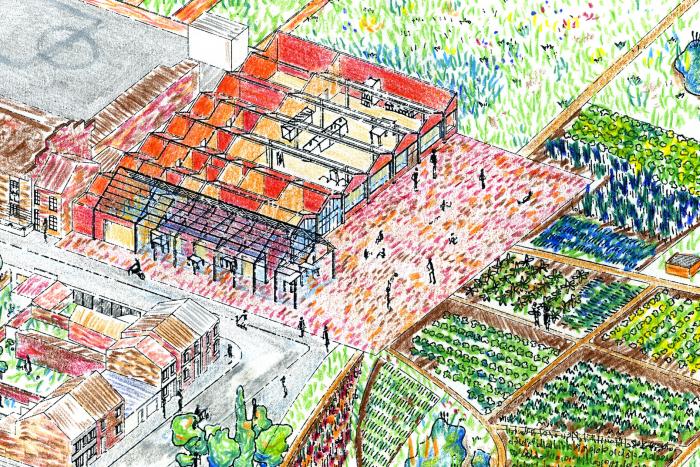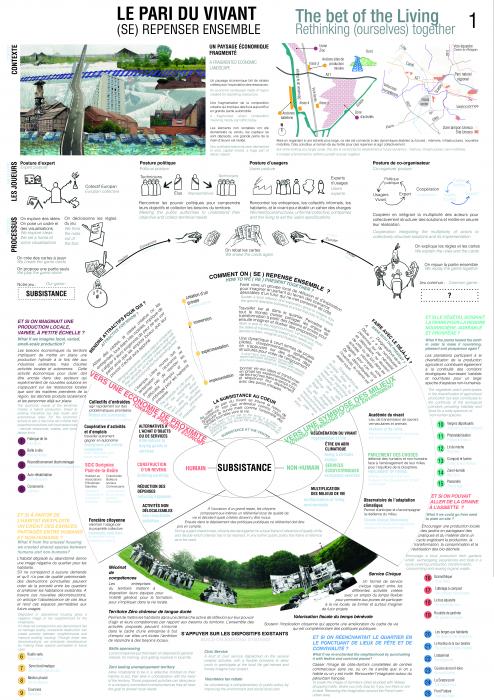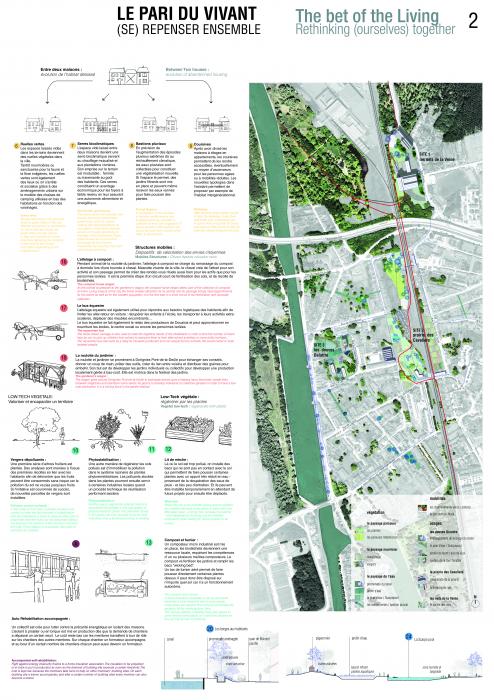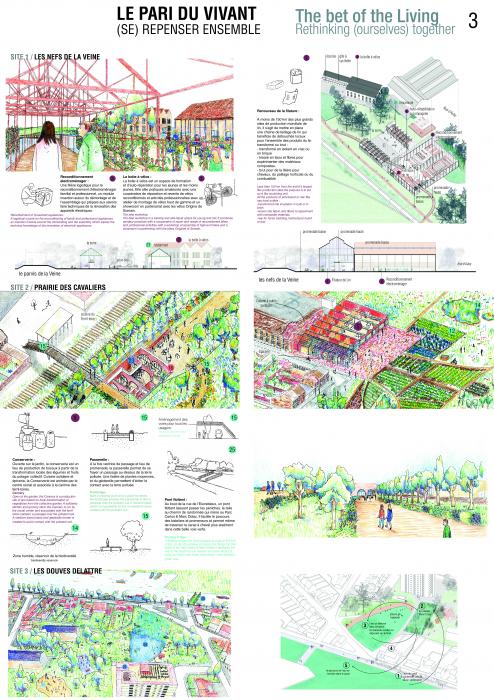The "Bet of the Living" is a public actions design framework aiming to shift european post-industrial shrinking cities perspectives by empowering its human and non-human actors and reinforcing its fragilized resources.
Dorignies
Pont de la Deûle
Douaisis Agglo
Nord-Pas de Calais Mining Basin
Post-industrial shrinking cities
"The Bet of the Living" has this long-term goal of reversing decades of extractivist logic while keeping the memory of the past as a heritage. It aims to address the complex issues faced by european post-industrial shrinking cities by believing that there are no left-behinds but riches to be reinjected into the soil by engaging humans and non-humans imagination and creativity.
We propose a set of actions corresponding to several themes and different scope of realisation. Often complementary, those actions can be also executed independently as temporary experimentations after being shuffled with local stakeholders.
We thus imagine a series of possibilities around the concepts of subsistence and intractivism.
The notion of subsistence is not understood as the objective of ensuring survival, but as the set of activities turned towards life. It consists in generating goods and services intended first and foremost to satisfy the needs of those who produce them, as well as those around them. This notion come from all the helping hands and services rendered and the small-scale informal activities. The objective is therefore to move away from large-scale market logic and to offer spaces to do things oneself, for oneself and on the basis of one’s strengths, resources and needs.
In support of the notion of subsistence, we have imagined the concept of intractivism. Like the reverse side of extractivism, intractivism reverses the principle of subtracting human and non-human resources to the point of extinction. Instead, intractivism revitalizes and regenerates diminished resources to give them a new richness, a new impetus.
In order to go beyond an approach based on competitiveness, which forces us to constantly catch up not to be eternally obsolete, we start from these concepts in order to separate, as much as possible, the production for profit, which is fluid and diffuse, from the production for life, which is necessarily anchored but dependent on larger scales.
Please highlight how the concept/idea can be exemplary in this context
Based on the two concepts of subsistence and intractivism, to question environment sustainability we had to deal with both human and non-human relation.
We propose action and design principles heading toward a symbiotic approach for all the users of the living environment.
We want to highlight ecosystem services that benefits at the same time for humans and non-human to be able to thrive together.
We also proposed to focus on the regeneration of life, the multiplication of living environments and the ability of being a climatic shelter to confort biodiversity.
To insure the realisation of those approaches, we framed non-anthropocentric organisms:
- the "Parliament of Things", a collective towards dialogue and defense of the rights of humans and non-humans in the development of their environment. Bringing together scientists, amateur clubs, hunters and farmers, the «Parliament of Things» is consulted whenever land use planning comes into play.
- the "Academy of the Living", a place dedicated to the transmission of vernacular and animal knowledge. At the Academy of the Living, pigeon fanciers, elderly people, local history enthusiasts
and young people from the social center meet for outings in the neighborhoods to discover the local fauna and flora, but also for creative sessions on the intangible heritage of the territory.
These organisms are here to grant the symbiosis of environments and to "officially manifest what already exists unofficially" as described by Bruno Latour.
Please highlight how the concept/idea can be exemplary in this context
Being highly process-oriented the "Bet of the Living" is not excluding high-end realisations and experiences. At the opposite, in order to give a chance to the stakeholders to have a representation of potentials realisations through time, we are tailoring - with a team of architects, public policies designers and artists - a set of actions leading to an actual vision of territory transformation.
If we take the example of Dorignies Pont de la Dêule, we started with the two concepts of subsistence and intractivism and came out with five prompts:
· - What if we imagine local, varied, small-scale production?
· - What if the plants heal the ground in order to make it nourishing, pleasant and prosperous again?
· - What if we create shared spaces between humans and non-humans from the unused housing?
· - What if we could go from seed to plate on-site?
· - What if we re-enchanted the neighborhood by punctuating it with festive and convivial places?
Each prompt leads to a series of actions, always site/people/environment-specific.
As an example, to the prompt "What if the plants heal the ground in order to make it nourishing, pleasant and prosperous again?", on the action cards suggested to develop a pollution control orchad. This orchad was thought to be implemented by the railway creating a sound-proof wall as well as a qualitative shadowed path for pedestrians. The orchad is only one part of a bigger landscape plan towards an environment symbiosis.
Please highlight how the concept/idea can be exemplary in this context
With "the Bet of the Living", we try to pull-out tangible action principles. However, the transformation of post-industrial shrinking cities is intimately intertwined with the life trajectories of the people in presence as well as from the whole living environment and cannot be limited to the «experts» that we are.
By imagining a framework for transforming public action, we aknowledge "the Bet of the Living" incorporates many areas of a territory and therefore involves multiple views and priorities depending on the actors.
To act accordingly, our first step is to create and sustain a local group of reflexion and exploration to imagine inclusive desirable future scenarios. By working in, on and with the neighbourhood, we let everyone share the transformation stake based upon actual needs and desires to then, imagine and illustrate proposals. After this phase of immersion comes a phase of experimentation where short term pilot project, ephemeral experimental triggers a new dynamic and enthusiasm. Upon their success and affordability, experimentations can be translated into long-term project with a sequenced of festive milestones.
To feed this group we use different public policies around volunteering for young people, for companies' involvement, for unemployment people experimentation. It allows to create new ties between different part of the local population and share some visions of further transformation.
Also, participation as to be more attractive, to avoid the trap of being only oriented toward participation specialist. For instance, during a giant shared meal, inhabitants decide together on a local frame of reference of quality of life and decide which criterias has to be retained. In any further public policy this frame of reference as to be used.
Please highlight how this approach can be exemplary
The concept of subsistence and intractivism serves as guidelines for design principles. "the Bet of the Living" initiates equal share to humans and non-humans in the transformation of public actions. Thus, the three dimensions are interlinked and had to be dealt with altogether.
Socio-economic situation and living environment are bond together and their transformation lead to a new quality of life.
Our answer of rethinking the situation of Dorignies Pont-de-la-Deûle, is by extension proposing new way to address post-industrial and shrinking cities context from a mix of public and private action point of view.
The project gives a clear dedicated playground for local actors to question, reform and dream the future of their cities in a highly sensitive and inclusive approach of the territory.
In a context where the ecosystem is fragilized, the traditional large industry has left their workers to unemployment, and mistrust towards the public authority is rising, this project is offering to place a bet on the power of these cities to be the craddle of new governances, opportunities and realistic utopias.
We wanted by our holistic approach to re-enchant Dorignies-Pont de la Deûle from some small neighbourhood scale immediate action and testing new answers to a wider economic and environmental situation.
"The Bet of the Living" finds its foundation on an innovative governance model giving equal opportunities for the ones who are often left behind or unheard to take part to the design of public actions. Humans and non-humans are equally heard and presented.
We propose to open the expert point of view to deal fully collectively to the current local and also wider issues. We want to start a new shared way of producing an expertise that goes beyond sole consultation. Instead of having always the same experts deciding, choices have to be open to be fully effective and they always must be questioned to be a factor of an empowering transformation, as opposed to the forced reconversion of the environment.
Also, through a process of deep acknowledgment and respect of what are the actual resources and richness in presence, the project is aiming to reform the sight often given to post-industrial shrinking cities by the large public but also its own inhabitants.
Our stance is to equip and empower by concrete actions the territory, its inhabitants and their representatives to trigger singular future scenarios and provoke new narratives instead of outsourcing experts' views replicating one-size-fits-all models that has proven their success in the past.
This proposition goes along with a set of actions cards that are opportunities of transformation that altogether lead to a empowering wounded territories to go toward a new but different quality of life for both human and non-human.
As an award-winning project of Europan 16, "The Bet of the Living" is benefiting from a generous communication coverage:
- exhibition
- publication
- invitations to talks and European conferences
In the near future, the next steps are to organize a workshop with the city of Dorignies Pont-de-la-Deûle to introduce the representatives with the methodology we propose. It could then lead to a proper collective implementation.
To extend this project and enhance its replicability, we are planning to share the framework we developed on our website as an open toolkit for students, young profesionnals and small-scale cities who wants challenge their vision of social economy, citizen engagement and environments symbiosis.
Other than giving an open-access to the framework developed for "the Bet of the Living", we are hoping to amplify this methodology and release a tangible set of actions cards. This set actions of cards will be the results of a series of workshops held with European post-industrial cities facing numerous challenges including unemployment, citizens distrust and endangered environment. Ideally, we are eager to cooperate with research groups and with interdisciplinary job fields working on these processes and contexts. We think there are lots of common ideas in several local public action in Europe that could be shared to design new transdisciplinary ways of acting for local empowering transformation.
@Bonnaud-Chabot, 2022
Content licensed to the European Union.
